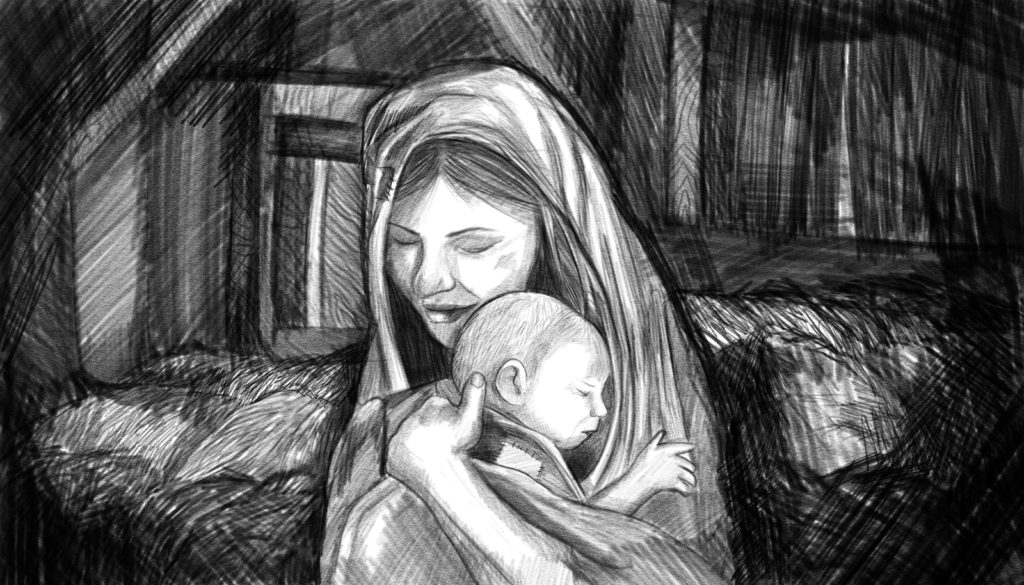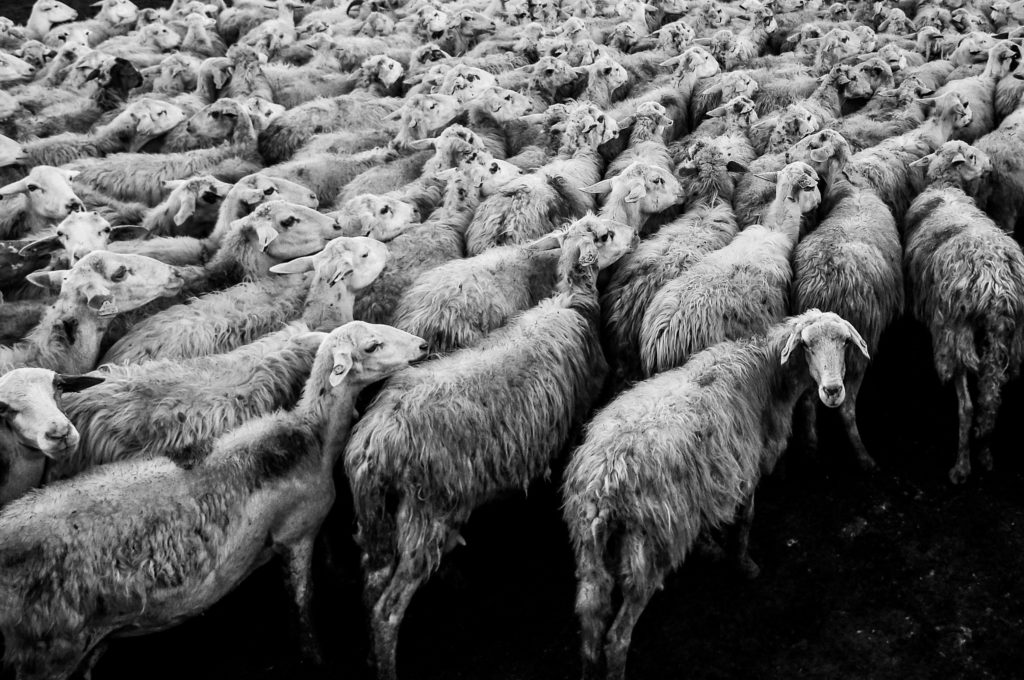What is the mark of true power? Should we have room in our society for outsiders and infidels? Is it ever right to disobey political authority?
Last week, we saw that the politics of Jesus began with the subversive praise songs of his young mother. Mary’s lyrical protest against oppression and poverty started forming the life of Jesus even before his birth.
But the story of Jesus’s birth is also bursting with profound political implications that are easily overlooked but equally important for the development of Jesus’s politics. This story provides thought-provoking answers to the questions I asked above.
1.
First off, the birth narratives of Jesus repeatedly give him political titles like “King,” “Ruler,” “Lord,” and “Savior” – all titles that Caesar Augustus claimed for himself. The Gospels clearly want us to see Jesus as the personal embodiment of God’s will for the world, not so subtly challenging the claims of the power-hungry rulers that Mary protested in her song.
And yet they tell us that Jesus entered the world like every other peasant in the first century: with great vulnerability and danger. In fact, the early Christians believed that Jesus was born in a cave for animals as his poor parents rushed to register for Caesar’s imperial data collection (Luke 2:1-7). When we stop to think about the high infant mortality rates of the first century, combined with the rugged conditions of Jesus’s birth, the unkingly vulnerability of this new “King” is thought-provoking.
 Jesus didn’t parachute into earth or roll up in a bulletproof SUV to a royal red carpet. Jesus began in solidarity with the weakness of every poor child – naked, vulnerable, in limbo between new life and a tragic end. In all of their insignificance, the basic details of Jesus’s beginning are rather extraordinary:
Jesus didn’t parachute into earth or roll up in a bulletproof SUV to a royal red carpet. Jesus began in solidarity with the weakness of every poor child – naked, vulnerable, in limbo between new life and a tragic end. In all of their insignificance, the basic details of Jesus’s beginning are rather extraordinary:
Jesus was born
to poor parents
away from home
in an animal shelter
controlled by an imperial superpower
in vulnerability and obscurity
devoid of any privilege.
2.
Second, Jesus’s first guests speak volumes about the people he would prioritize later in his public career when he developed a bad reputation for being “a friend of tax collectors and sinners” (Matthew 11:19).
Luke tells us that shepherds were Jesus’s original audience, his first “constituency.” In first century Palestine, just like in traditional societies today, shepherds were among the poorest and least privileged groups on the outskirts of society. They were likely dirty, smelly, uneducated youth.
“Peasants [were] located toward the bottom of the scale of power and privilege.”
According to Joel Green, New Testament scholar
But not only were the shepherds of Bethlehem Jesus’s very first guests, the ones privileged to first receive the angelic message and welcome the new King before anyone else. Luke tells us that these shepherd youth quickly turn around to become Jesus’s first ambassadors (2:20).
Imagine the “Who’s Who” list of Rome and Jerusalem or our global cities today. Luke intentionally name-drops a few of these “big men” at the top of his story (1:5; 2:1-2). But he cleverly does so to highlight that they had no idea Jesus was born or that a new movement was being launched that would change the world forever. It was a group of marginal nobodies who got the V.I.P. invitation.
This is why Luke calls Jesus’s birth “good news for all people” (2:10). From the very beginning, Mary’s radical song is being fulfilled in her son: “God has brought down rulers from their thrones, but has lifted up the humble” (1:52).
3.
The third piece of Jesus’s birth narrative is perhaps the strangest and most significant for the formative politics of Jesus.
According to Matthew, Jesus’s first official visitors were “Magi from the east” (2:1). Scholars believe that the Magi were Persian priests and royal advisors renowned for their magical powers. In other words, they were infidels, foreign people that the orthodox guardians rejected as dangerous to the religious and political order (2:4, 20).
In fact, Matthew brilliantly overlays his story with a biblical prophecy, which foretold that a messianic “ruler” would come and his “star” would lead to the “destruction” of Israel’s eastward “enemies” (Numbers 24:17-19).
But now in Matthew’s subversive reinterpretation, the “star” leads Israel’s eastern enemies to the Messiah, and they are the first ones to believe in him!
So far from excluding – much less destroying – ancient enemies, the infant King’s family welcomes them. From the outset, Matthew shows us that Jesus’s kingdom would be shockingly inclusive and break through the boundaries of religion and nationalism that divided the world into insiders and outsiders, citizens and enemies. Indeed, some commentators trust the historical reliability of this story, precisely because it is so unlikely that Matthew would include something so scandalous if it didn’t actually happen: Jesus’s family offering hospitality to foreign magicians, who hail Jesus prior his own people and then simply returning to their homeland. Perhaps we find here the biographical roots of Jesus’s counter-cultural teaching,
“Love your enemies, and do good to those who hate you” (Luke 6:27)
But there’s more to this striking episode in Jesus’s story. Matthew tells us that the Magi came to “King Herod” seeking “the king of the Jews” (2:1-2). Unsurprisingly, Herod, who was also titled “king of the Jews” and was famous for his brutality, was “disturbed” by this news of a rival king. So he cleverly ordered the Magi to report back to him so that he too could “worship” – murder! – the young king (2:8).
But the Magi were dissidents, truth-seeking outsiders who were willing to violate official authority in order to obey God. Having recognized Jesus’s kingship with royal gifts (2:11), Matthew tells us that they disobeyed Herod’s order and “returned to their country by another route” (2:12).
This is an astonishing historical event: Christianity begins with an act of political disobedience against a murderous ruler on behalf of a vulnerable child rumored to be king. Matthew brilliantly narrates that the first recognition Jesus’s kingship nullifies the pseudo-authority of a tyrant and justifies an act of treason by political dissidents. In fact, Matthew praises them for “outwitting” the murderous king (2:16).
Even so, there isn’t a hint of triumphalism in the story of this peasant-born king welcomed by shepherds and hailed by infidels. Herod, like Pharaoh in the Exodus, is infuriated by this defiance, and he orders a massacre against the boys of the region to try to kill his rival (2:14-18).
Thus, the ache of injustice in Mary’s song echoes in the infancy of her son. The opposite of what we would expect of a divine ruler, Jesus is raised as a political refugee whose family had to “escape to Egypt” during the middle of the night to avoid being slaughtered (2:13-15). Jesus would grow up familiar with danger, displacement, and undoubtedly the suspicion of those who saw his family as threatening outsiders.
***
To sum up, the animal-shelter birth of King Jesus embodied solidarity with the poor’s vulnerability and weakness. It welcomed bottom-class shepherds as Jesus’s original audience and ambassadors. And it included foreign infidels who ended up saving Jesus’s life with their courageous disobedience to “King Herod.” Even so, Jesus’s first years were spent as a political refugee in a western country amongst historic enemies.
To my mind, this is the opposite of so many of our political stories today with leaders born into privilege, surrounded by power, and using their stardom to enrich themselves and destroy their enemies. The resistance and reversal of Mary’s song is starting to unfold.
Whatever we make of the politics of Jesus, its beginning is both dramatically different and strangely familiar to our politics today. Dietrich Bonhoeffer brilliantly summarized the provocative implications of Jesus’s birth:
“That for which kings and statesmen, philosophers and artists, founders of religion and teachers of morals exert themselves in vain now takes place through a newborn child… In the very lowliness and weakness of the child the authority over all the world has its origin.”
Dietrich Bonhoeffer
Next week, we look at Jesus’s hero.
Stop & Think: Questions to Wrestle With
- How do you look at vulnerability? Is true power found in security and status or the courage to enter into the weakness of the poor and oppressed?
- Who are our shepherds and Magi today? Do our communities and their “stars” welcome the least privileged and those labeled as foreign enemies, or do we build walls to keep them away?
- What do you think about the Magi’s act of disobedience to King Herod? When should we disobey political authority today?
- Did you know that Jesus spent his early years as a political refugee? How do you think this influenced Jesus’s political consciousness, and how does it change how you see Middle Eastern refugees today?
***
“It is this faith in and hope for the world that found perhaps its most glorious and most succinct expression in the few words with which the Gospel announced their ‘glad tidings’: ‘A child has been born unto us.’”
Hannah Arendt, The Human Condition




